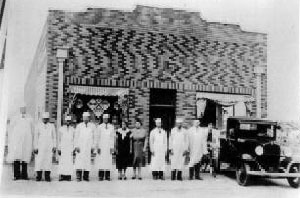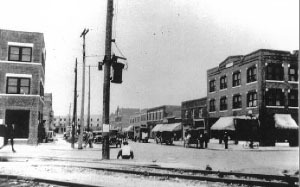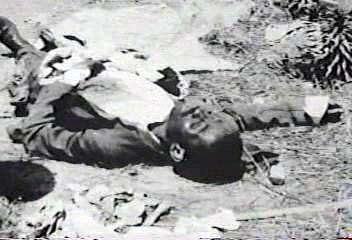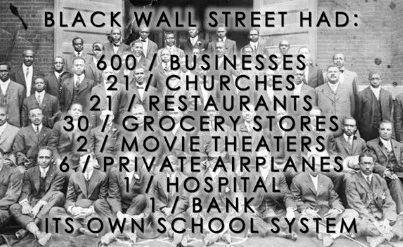Oklahomans for Reproductive Justice (OK4RJ) consists of a group of young Okies dedicated to caring and advocating for Oklahomans, using community and grassroots approaches to raise awareness and advocate for access to full reproductive freedom for all, regardless of race, class, ability, gender identity, or sexual orientation. We believe that social justice issues are inseparable from reproductive issues and advocate for a holistic view of reproductive justice Visit our site at ok4rj.org
Don't wanna be here? Send us removal request.
Audio
Longtime friend of OK4RJ Jessica Luther was interviewed on Citizen Radio about the state of reproductive rights, health, and justice in Texas. We <3 Jessica!
Allison interviews Jessica Luther (@scATX) about vanishing reproductive rights, Texas progressives fighting back, the Wendy Davis campaign, college football, sexual assault, and consent laws. Also, the woman in the street harassment video is getting rape threats and a BIG problem with that video (almost all the white street harassers were edited out), many uninvited guests drop by, and Jamie’s show starts Monday! (Get tickets nownowNOW)
Upcoming live gigs: NYC! Jamie’s NEW improv show “Kilstein: A People’s Guide to Comedy” is Nov 3 and Nov 10, and Citizen Radio Live! returns Nov 14 at Union Hall. Also, #AddictedToFriendship shows in St. Louis, and Chicago. Check Jamie’s site for links!
Remember to order #NEWSFAIL: all about our shitty media and how alternative media will save us all and give us a nice review on Amazon!
Citizen Radio is a member-supported show. Visit wearecitizenradio.com to sign up and support media that won’t lead you to war, and keep CR Productions growing!
9 notes
·
View notes
Link
Hello my beautiful friends. I’m from Texas if ya’ll didn’t know… now you do. I live and have lived all my life in a place called the Rio Grande Valley, a border region right next to Mexico. Right now, as a region, we are experiencing a reproductive crisis. Both of our...
192 notes
·
View notes
Photo







Stealth Attack: The New Abortion Laws
What you need to know
by Jen Sorensen
33K notes
·
View notes
Photo

For homeless gay teens in Little Rock, few places to turn
An estimated 2.8 million young people in the United States find themselves on the streets, and the streets of Little Rock are no exception.
The state has 14,000 homeless children, according to the Campaign to End Child Homelessness, and the state ranks third worst in the nation for homeless children.
While there are homeless shelters, very few places offer a space for youth who are gay. That didn’t sit well with Penelope Poppers.
"I saw the need directly, and I decided that nobody was doing things for LGBT folks locally," Poppers said. "I realized that a large number of the facilities in the area are run by conservative groups and churches who are just not supportive of and are opposed to gay people."
Read more
(Photo: David Pierini/Chicago Tribune/MCT)
192 notes
·
View notes
Photo









13K notes
·
View notes
Link
This will be a very short diary. It will not contain any links or any scholarly references. It is about a very narrow topic, from a very personal, subjective perspective. The topic at hand is …
11 notes
·
View notes
Quote
I’m an OBGYN and I practice at a jail, where I take care of incarcerated women. People often ask me, how did you come to work with incarcerated women? I was in the middle of my first year residency, delivering a baby. Everything was very familiar about the delivery scene; the nervousness, wondering if everything was going to be okay, helping the woman to push. But the one thing that was different is that she was shackled to the bed; she was a prisoner. And that moment troubled me so deeply that I developed an interest in learning more about these women. Women make up a much smaller proportion of the correctional population than men — about 9% of everyone who is incarcerated. And 62% of [those] women are mothers to children who are less than 18 years old. Because women comprise such a small proportion, their gender-specific needs have been neglected. That’s particularly salient when it comes to their healthcare. In theory, women do have the choice to have an abortion if they learn they are pregnant when they are in prison. There are constitutional guarantees — the 8th and the 14th amendments — and a number of judicial precedents, so it’s very clear that incarcerated women should have access to abortion. However, in practice, the people who are making the decisions have incredible discretion and many women lack access to abortion if they choose it. About 1400-2000 births occur every year to women who are behind bars, and what they get for prenatal care is highly variable. There are standards that require prisons to have prenatal care onsite, but on the ground, some women have to be transported offsite and some women don’t even get prenatal care. In labor, they usually get transported to an outside hospital. They can’t have any family support members in the room, and only 15 states have laws restricting the shackling of women in labor and delivery. A woman in labor, shackled, is what inspired me to work with this population. It’s inhumane and unnecessary, and it poses a lot of medical risks to the mother and the fetus. It also interferes with our ability to do emergent interventions if necessary. People think prisons and jails are far away and we forget about the people who get locked up inside; we think they have nothing to do with us. So I hope I’ve given you some things to consider about what it’s like to be a woman when you’re in the grip of the prison or jail system.
From Dr. Carolyn Sufrin’s talk on incarcerated women and reproductive healthcare. Filmed at TEDxInnerSunset.
Watch the full talk here »
(via tedx)
10K notes
·
View notes
Quote
This is the never-ending balance game. On the one hand, you want people to understand clearly that the overall culture is highly conservative, oppressive, that legal protections are beyond lacking etc… but on the other hand you’re obsessively proud of the collaborative, progressive, even radical LGBTQ+ community that exists here despite never really being invited in on the national conversations. It’s like, “Yes we have queer college groups, yes we have Safe Schools Coalitions, yes we have PFLAG chapters, yes we have LGBTQ film festivals and photography exhibits. Why do you think we don’t? I mean, I know why you don’t… but why don’t you?” You know? Balance.
Spilling the Sweet Tea on Queer Organizing in the Deep South, via Autostraddle
(via takerootrj)
8 notes
·
View notes
Photo

A million congratulations to ABQ organizations Young Women United, NM Religious Coalition for Reproductive Choice, Respect ABQ Women and countless independent organizers and activists in New Mexico on their takedown of the first proposed municipal 20-week abortion ban by a 55/45 margin last night! Read up on local coverage here.
13 notes
·
View notes
Link
Albuquerque is voting on a city-wide 20 week abortion ban TODAY. This ban would clearly impede access significantly for folks in ABQ and New Mexico. Even more, Southwest Women’s Options provides abortions after the second trimester in a region where bans such as this one are prevalent, making it important to abortion access for the entire region. We’ll update you as we can.
3 notes
·
View notes
Quote
In the United States, a nation that spends more on health care than its industrialized peers, Black women die from pregnancy-related causes at rates three to four times higher than their white counterparts. Though they generally have less access to prenatal care and health insurance, Black women also have more frequent and longer antenatal hospital stays. They are more likely to experience pregnancy loss or complications when compared with whites and Hispanics…Black women are disproportionately criminalized for drug use or decisions made during pregnancy. In these cases, we see a culture that no longer commodifies Black reproduction, as in slavery, but nevertheless subjects Black female sexuality, reproduction, and mothering to harsh, public scrutiny. Yet Black women’s maternal death rates garner little comment. Why Don’t More People Care About Black Maternal Deaths?
Why Don’t More People Care About Black Maternal Deaths? (via lamaracuya)
986 notes
·
View notes
Quote
If [someone] has reproductive choice but can’t afford it, with all practical intents and purposes, [they] do not have reproductive choice. A right on paper is not a right.
Katherine Cross (via homoarigato)
3K notes
·
View notes
Quote
One of the things Take Root organizers are invested in is questioning the narrative that people from small towns and conservative districts have to leave home to pursue activist work. “I think that comes from a certain amount of privilege – that you have the ability to leave, that you have the resources, or that you even have the desire to leave,” said Sandra Criswell, an organizer with Take Root and Oklahomans 4 Reproductive Justice (OK4RJ). These conversations offer a challenge to mainstream media outlets, which often fall back on easy tropes, naming red states exclusively in the context of disasters and failures. For some, it’s also a way of pushing back against stereotypes about red states and saying you love where you’re from.
"The Long Emergency Road Ahead": Reproductive Justice Organizing in Red States and Rural Spaces
4 notes
·
View notes
Link
2 notes
·
View notes
Quote
A woman’s chance of being killed by an abuser increases by 700% if he has access to a firearm.
A woman’s chance of being killed by an abuser increases by 700% if he has access to a firearm. (via librarianpirate)
Equally terrifying: “Femicide, the homicide of women, is the leading cause of death in the United States among young African American women aged 15 to 45 years and the seventh leading cause of premature death among women overall.”
(via curiousgeorgiana)
14K notes
·
View notes
Link
Scolding black women for not participating in clinical trials also ignores the very real history of doctors and medical scientists in this country exploiting poor black populations in the specific context of non-consensual clinical trials. Of course there's a marked avoidance and distrust of clinical trials. Consent continues to be an issue in the medical-industrial complex to this day, and it has a racialized historical context that apparently some doctors would like to forget.
Two cervical cancer vaccines that are recommended for all pre-teen and early teen boys and girls miss the strains most likely to infect black women, researchers reported Monday.
“It looks like we have different strains by race,” Cathrine Hoyo, an associate professor in Duke University’s obstetrics and gynecology department, told NBC News in a telephone interview.
“African-American women are about 20 percent more likely to develop cervical cancer and almost twice as likely to die from the disease compared with non-Hispanic white women,” Hoyo added.
This egregious and literally deadly error is being attributed to a lack of diversity among research subjects while the vaccine was in development. This is the problem with white women being the default in feminism and in society - it can literally kill black women. “Your racist society will give you a racist science.”
4K notes
·
View notes
Quote
“Reproductive justice” is more than the sum of its parts! Even if an organization or campaign is associated with both reproduction AND justice, that entity is not necessarily embodying the tenets of reproductive justice. Asking “does this center the needs and elevate the voices of women of color?” is a pretty solid way of figuring it out. Lastly – keep in mind that reproductive justice activists often find themselves in an adversarial position in relation to health and rights-based groups, acting as a check on problems like exclusivity and access.
OK4RJ | Reproductive Justice 101: Things That Aren’t Reproductive Justice
5 notes
·
View notes